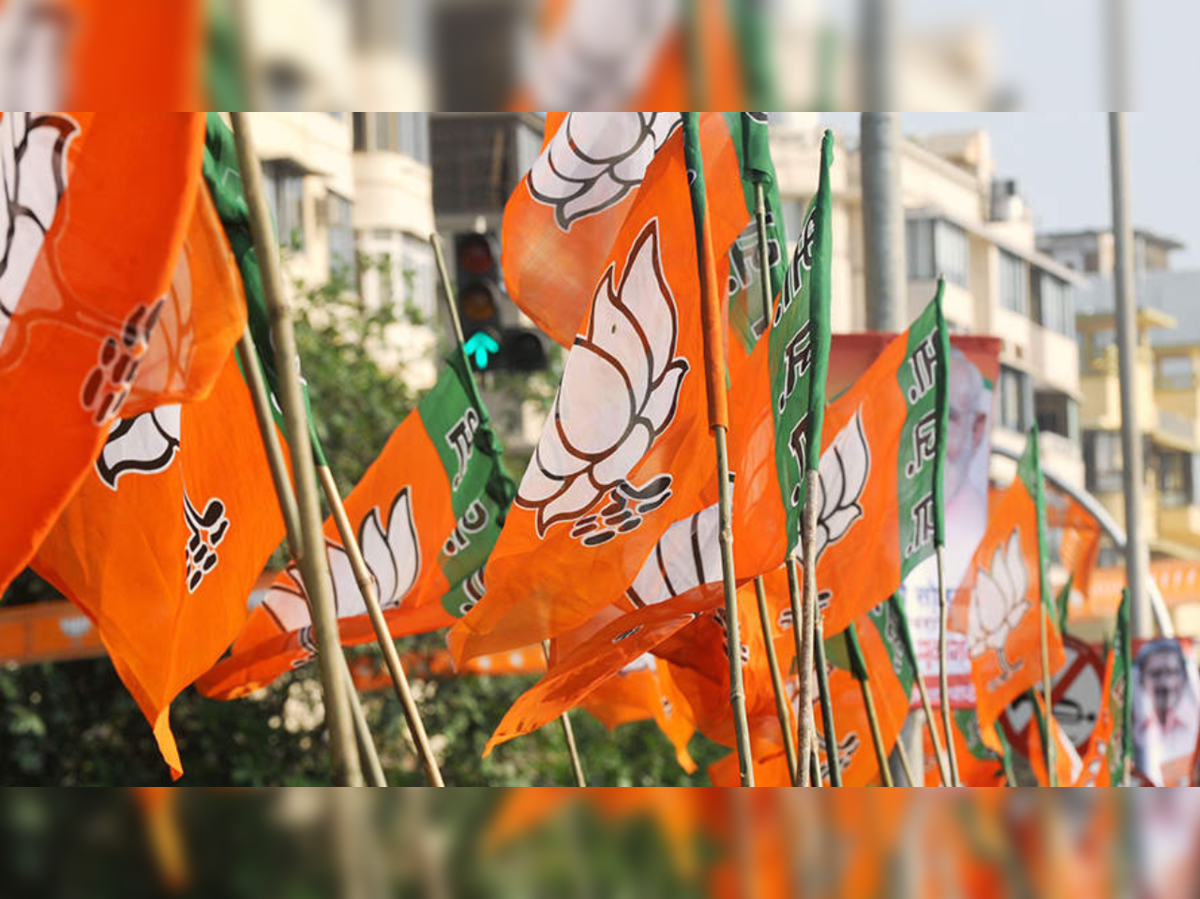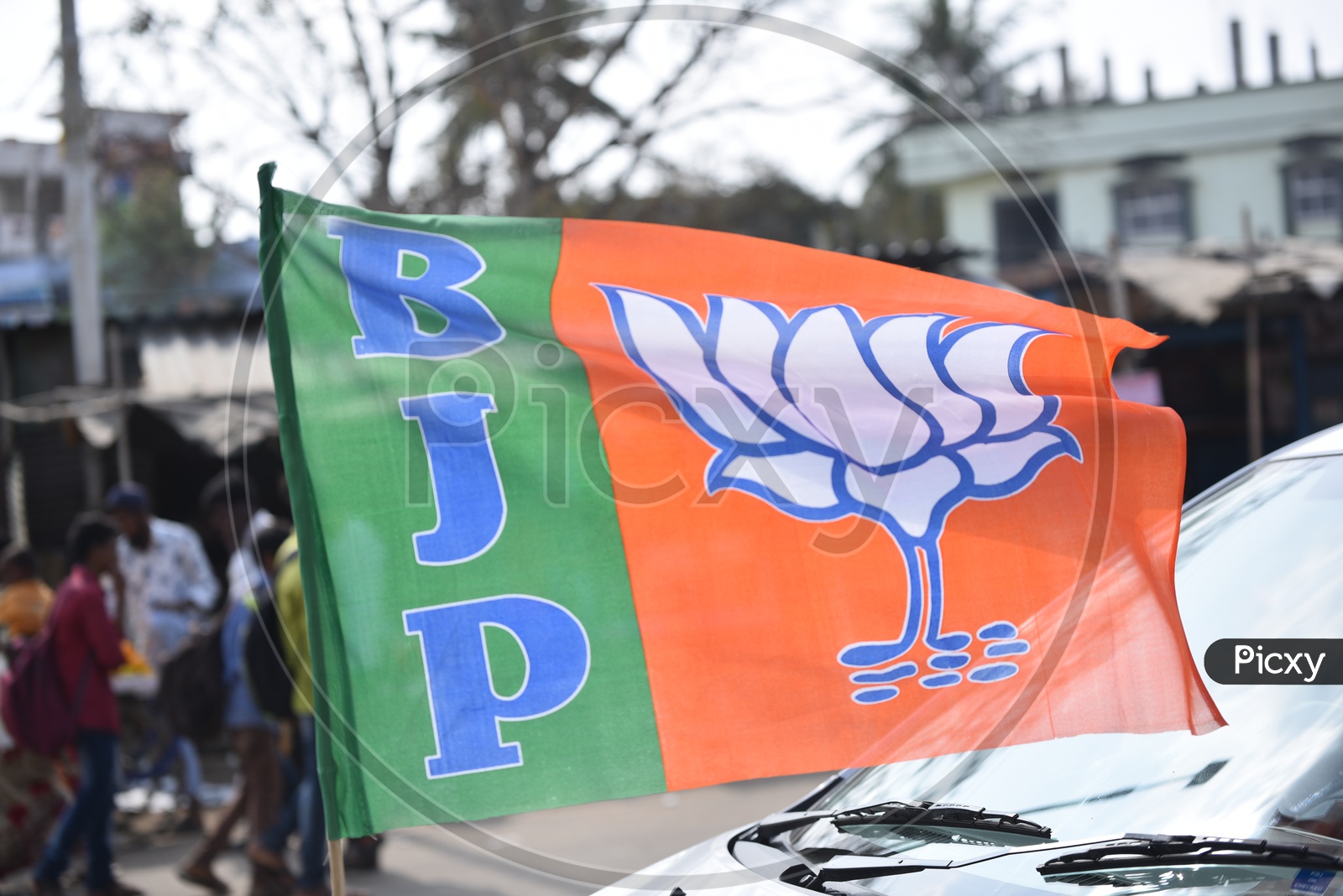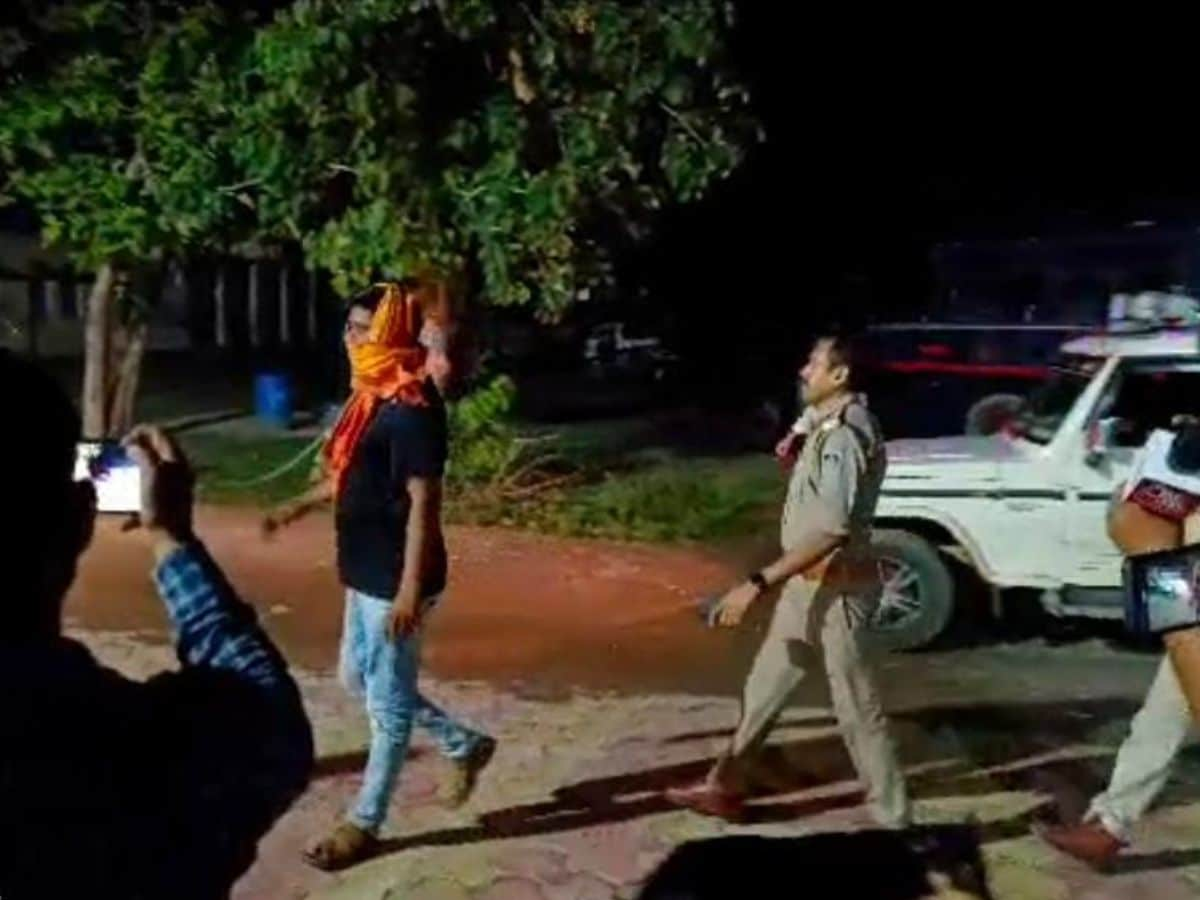
BJP MLA’s incessant crimes evince rising impunity!
The Bharatiya Janata Party’s notorious reputation for transgressions and incessant criminality by leaders and members has peaked over the years. The BJP’s inclination to firmly dwell on religious sanctimony reflects the distressing trajectory of the decline of social cohesion in the country. The rise of such fanaticism and religious schism produces degenerates in society that perpetuate a continuous trend of hate-mongering and unconstitutional behaviour. The constant dissemination of polarization is bound to manufacture a set of beliefs that are embedded in a systematic organization that promotes vehement disorder and fragmentation. Undeniably, the disorganization accelerates the majoritarianism mindset, which becomes a passage for people in power to instrumentalize political dominion over marginalised people.

On Tuesday, the 18th, at around 12:30 p.m., an official stated that a car with a BJP Flag and sticker knocked down a man sitting on the road in Uttar Pradesh’s Ghaziabad. A recent video displays a terrifying scene of a man mercilessly knocking down a man seated on the road by his car. The visuals shows that the driver’s vile sense of ignorance, he dragged the man after hitting him with his car until he was dead. The incident was recorded by two young men, and that alerted the driver to step out of the car. The accused driver of the car is Saurabh Sharma, who is a resident of Mahagunpuram in Ghaziabad. However, the deceased has not been identified until now. Additionally, the accused is in police custody, and a case has been filed at Kavi Nagar Police Station, according to the ACP of that station.

Two grave issues are raised by the incident. Firstly, does the BJP Flag give the man a ticket to disregard rules that are very much applicable to all citizens? Secondly, will the BJP flag act as a means of eluding legal detention? The rhetoric exists because of a longstanding record of crimes by BJP members that lie dormant without accountability. A major political failure that has developed over the years is the paralysing fear of a man in authority evading law enforcement. On January 1, 2023, a 19-year-old woman named Anjali was brutally dragged by a car for around 13 kilometres and killed in outer Delhi’s Kanjhawala area. After the accused struck the victim’s scooter, her body rolled under the vehicle and became stuck in the undercarriage. Anjali died as a result of severe, irreversible head wounds, and her bones were visible due to the deep scarring. The Special Commissioner of Police (Law and Order), Sagar Preet Hooda, stated that the accused had been charged under Section 302 IPC (Murder) in place of Section 304 IPC (Murder). Interestingly, outside the Sultanpuri Police Station, a hoarding about the BJP displayed a photograph of the accused, Mittal. According to AAP MLA Saurabh Bharadwaj, one of the five accused, Manoj Mittal, is a member of the BJP Party. Mr Bharadwaj shared with the media that the eyewitness who reported the case to the police had made 22 calls, but the police remained oblivious and failed to catch them red-handed. The ceaseless intersections of BJP members with growing crimes are unnerving and induce mass panic and disbelief in the system that essentially drives the nation.

Another disturbing video went viral on July 4, 2023, in which a BJP Leader was drunk and urinating on a helpless tribal youth. Pravesh Shukla, a BJP worker in the Sindhi district of Madhya Pradesh, was caught urinating on a tribal man belonging to the Kol tribe, named Dashmat Rawat. In the video, the BJP MLA appeared drunk and nonchalantly urinated on the tribal man while smoking a cigarette. Pravesh Shukla’s father, Ramakant Shukla, affirmed his son’s affiliation with the BJP and served as an assistant to MLA Kedarnath Shukla. Kedarnath Shukla strongly rejects the claims of any close connection with the accused and claims that he only knows him. The victim and the accused, according to the locals, are both residents of the same Kubri village. Rawat had approached him to ask for his unpaid fees, and Shukla had then urinated over him. The police had filed an FIR against him under sections IP 294 (obscene act) and IPC 504 (intentional insult to provoke breach of peace) and under the Scheduled Caste and Scheduled Tribes (Prevention of Atrocities) Act. The former Chief Minister of Madhya Pradesh, Kamal Nath, strongly condemned the incident and claimed that it displayed the brutality towards tribal identities.

It is important to note that the urination case is not an isolated one. India is regressing as a result of the ongoing statistics of caste-based violence that continue to rob marginalised people of their agency. It would be nothing less than apathy to view an event like this with tunnel vision because of the history of incessant brutality and dehumanisation that is firmly ingrained in the very nature of the existence and identities of marginalised people. The reverberations of reestablishing Brahmanical supremacy have ultimately impacted the non-elite section of society. The marginalised group continues to experience widespread disparity in terms of social status and economic growth. There has been a dramatic growth in the brutalities and ostracization faced by minority communities, and the claims have been denied by the Bharatiya Janata Party with no action or measures to control them. Caste is intrinsically linked to Indian society; therefore, it is significant to examine the scale of jobs and education. However, the centre seems to have an apprehensive stance on caste surveys, specifically the lack of records regarding Other Backward Classes (OBC). The BJP, however, explains that conducting caste censuses cannot be done due to administrative, legal, and technical issues.
Pravesh Shukla’s arrest video, which has been going viral, has outraged the youth. Shukla’s body language while he walks towards the police station demonstrates the jarring visual of an unhinged criminal with no fear or regard for the system. In the video, the body language of the police is distinctively suggestive of the fear that lingers towards powerful men in custodial spaces. It can be concisely seen that there is a certain degree of careless supervision solely because of his alleged affiliation with the ruling party.

While some members of the ruling party view their party seats as an effective instrument to marginalize minorities, it simultaneously opens avenues for their children to lead the way. A 19-year-old woman was gang raped by four men, of whom one is alleged to be the son of a local member of the BJP. The woman was allegedly abducted and raped in Madhya Pradesh’s Datia district on July 14. The investigation is in process, and the police have detained two minors and arrested one of the accused, who is an adult. While the remaining one has disappeared, a reward of Rs. 10,000 was announced based on the accused’s whereabouts. The accused were charged with violating IPC 376 D (gangrape), IPC 354 (assault or criminal force on a woman with the intent to violate her modesty), IPC 342, and various POCSO Act provisions.
While caste-based violence has seen a major rise in the nation, the promulgation of widespread religious fundamentalism and dogmatism has mass-produced an incredibly hyper-masculine mindset. The motif of extreme hyper-masculinity is a feature of deeply embedded casteist behaviour that seeks to hegemonize minority groups and gender. Fascinatingly, there is always a need for some members of the Ruling party to constantly feed the idea of “ours and “theirs” by appropriating women as commodities and asserting a cryptic sense of ownership. Over time, India has manifested some of the most patriarchal ideas, driven by a planted sense of false conservatism concerning cultural revival, which is strategically weaponized to cater to their political agendas. The rudimentary vision of cultural revival remains futile, as it benefits no one but a certain section of people that continue to thrive on cultural othering.
Indian wrestlers began calling for an investigation in January 2023 in response to accusations that BJP MP Brij Bhushan Sharan Singh had sexually harassed female wrestlers while he served as president of the Wrestling Federation of India (WFI). The protest began at Jantar Mantar on January 18 by leading women wrestlers Bajrang Punia, Vinesh Phogat, and Sakshi Malik, demanding Singh’s resignation and immediate arrest. MP Brij Bhushan is a member of parliament and has multiple allegations of sexual harassment against him. The MP blatantly denied all accusations against him and claimed to hang himself if any woman could prove the charges. He added that the wrestlers were pawns of the opposition party, attempting to tarnish his image. The terrifying element of this event is the Delhi police’s staunch disapproval and persistent brutality towards the protesters. The police refused to conduct any investigations or bring any official charges against him. The police had to justify the Supreme Court for not filing a case against Singh. Sakshi and Vinesh revealed to the media that despite seven women, including a minor, coming forward to file complaints against Brij Bhushan, the police declined to file an FIR. On May 3, chaos had taken over between the wrestlers and the police regarding makeshift beds at Jantar Mantar. Vinesh Phogat expressed that she experienced abuse and aggression from male policemen.

On May 28, as Prime Minister Modi inaugurated the new Parliament building, wrestlers protested outside and were detained by the Delhi Police. Following this, the Police demolished their protest sites at Jantar Mantar. The visuals of May 28 probe into the realities of power and position in a nation that has been paralysed by a longstanding administration that fails to vigilantly investigate the claims of women who were once lionised for bringing home medals and awards.
According to a local BJP Leader from Gonda, Brij Bhushan Singh’s social position in Gonda is so strong that he does not even need a party to win; his name alone is enough. Brij Bhushan Singh has been simultaneously charged under multiple sections of the Indian Penal Code, including Section 307 (attempt to murder), 147 (spreading nuisance), 148 (possessing a deadly weapon), and 149 (unlawful assembly with a common object). While we ruminate back and forth about the crimes committed by MLAs of the ruling party, we must also interrogate the state of our justice system. What does the incapacitated nature of the system essentially warn about the future? There are a dubious number of politicians with significantly increasing criminal records; however, the link between crime and politics is an incessant affair and not quite new.

The sheer lack of responsibility and noninterference during times of turmoil and crisis has marked a consequential decline, which amounts to a deep despondency among people and unreliability for the justice system. A video has surfaced wherein two women from the Kuki-Zo community were paraded naked and allegedly gang-raped. While it is no surprise that men ultimately view women as content sites, the situation has surpassed and signified the degree of brutality in Manipur. Despite such violent records of crime, the centre seems unagitated, with a deafening muteness that exceedingly elucidates the incompetence of the administration. It is shocking to see the centre’s dismissal to address a two-month-long crisis that resulted in several deaths and displacements. No other event is a competition of the Centre’s deafening silence and shocking inaction that has raised glaring questions about the government’s sense of responsibility towards the North East. Solely deploying paramilitary forces to control the situation only widens the cracks in the inefficiency of the central government because the centre must ensure the safety of the people. In a state that has the most complex demographics, contesting identities, and several insurgency groups, there is a need to alter the way we view the North East to resolve the crisis.
Democracy allows citizens to highlight the government’s ineffectiveness in addressing the needs of the nation. Asking questions and demanding answers is ingrained in the ethos of democracy. But can democracy thrive in a country that protects its power holders with criminal records?




